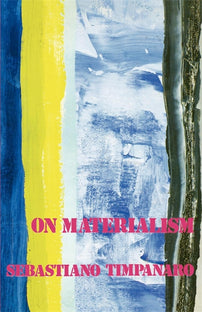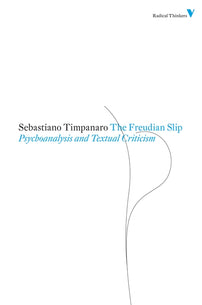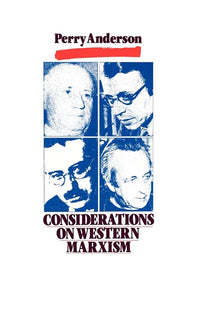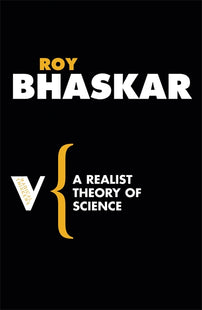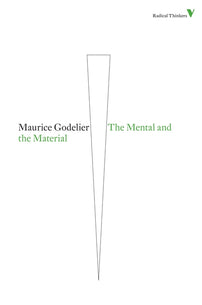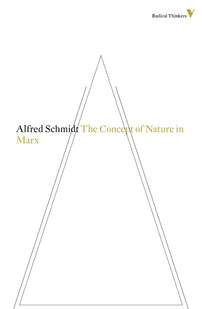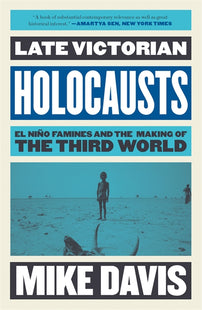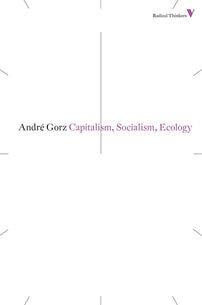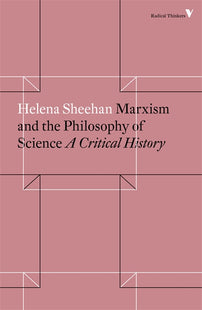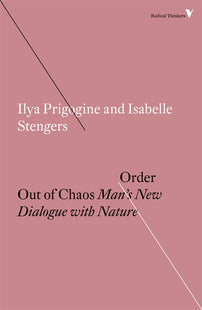Between Nature and Society: Introductions to On Materialism
Timpanaro launches a polemic against the two major tendences of post-war Western Marxism — Frankfurt School critical theory and Althusserian structuralism — and a defense of the late Engels in an effort to reunite historical materialism with a materialism of the natural sciences, inspired by the writings of Giacomo Leopardi.

First published in Italy in 1970, Sebastiano Timpanaro's On Materialism was presented by New Left Books in 1975 in an English translation by Lawrence Garner. A trained philologist and committed socialist (a member of the PSI until 1964, and the PSIUP thereafter), Timpanaro here launches a polemic against the two major tendences of post-war Western Marxism — Frankfurt School critical theory and Althusserian structuralism — and a defense of the late Engels in an effort to reunite historical materialism with a materialism of the natural sciences, inspired by the writings of Giacomo Leopardi. "The most distinctive theme of Timpanaro’s own work," Perry Anderson has written, "is...the inevitability of the ultimate victory, not of man over history, but of nature over man."
It is thus more finally pessimistic, with a classical sadness, than that of perhaps any other socialist thinker of this century. In all these ways, Timpanaro can be regarded as paradoxically yet unmistakably part of the tradition of Western Marxism that he opposes...This said, it must immediately be emphasized that in other respects Timpanaro’s work presents a genuine and manifest contrast with the norms of Western Marxism. The differences are that Timpanaro’s philosophy has never been primarily reduced to a concern with epistemology, but has sought to develop a substantive outlook on the world, in a critical allegiance to the heritage of Engels; that his use of Leopardi has never relied on a claim that Marx was ever influenced by or knew of the poet, or that the two systems of thought are at all homogeneous — Leopardi being presented as supplying something missing, not something hidden, in Marx; and that his pessimism is consciously declared and defended as such, in a limpid prose.
Below we present two prefatory essays from On Materialism, in which Timpanaro argues the necessity of a more thoroughgoing materialism as a check against bourgeois idealism, on one side, and the "vugar materialim" represented by the renewal of essentialist biologism in the UK and North America in the mid-1970s, on the other.
Foreword
I am only too well aware of what might be termed the pre-scientific and pre-philosophical nature of these essays. In them, requirements are stated and a polemical position taken up; but their theoretical stance is neither rigorously grounded nor fully developed. My decision, despite this, to publish them together in book form is based on the belief that, at the present stage of Marxist discussion, they can fulfil a provisional function of critical stimulus.
In recent years, in connection with the crisis of the official communist parties, the Chinese cultural revolution, and the rise of new revolutionary currents in the West, we have seen a revival of theoretical interest. The need to struggle against reformism has clearly shown how essential it is not to simply entrench oneself in a defence of Marxist-Leninist orthodoxy, but to rethink Marxism in the light of everything new that has occurred in the capitalist West, in China, and in the third world. Unfortunately, however, the two main interpretations of Marx which have come to influence the revolutionary left in the West in recent years — one furnished by the Frankfurt school and its various offspring, the other by Althusser — allow very little of Marxism to survive. Moreover, and this is far more grave, they represent in many respects a step backwards: the former because, following in the path of tendencies which were already very widespread in the Western Marxism of the twenties and thirties, it ignores the need to found a "scientific socialism" and sees in science only bourgeois false objectivity; the latter because, although it does proclaim most emphatically the scientific character of Marxism, it takes from twentieth-century epistemology a Platonist concept of science which is not that of Marx and Engels and which makes it impossible to pose correctly the relation between theory and practice.
Anyone who saw these interpretations simply as intellectual errors, without understanding that they reflect objective difficulties facing the working-class movement in the advanced capitalist countries, would be a very poor Marxist indeed. The main way to defeat these tendencies, in other words, is not through philosophical discussion alone, but through a study of contemporary capitalism, the contemporary proletariat, and the nexus between capitalism and imperialism: a study, it goes without saying, linked to and constantly verified by political action. And yet, at the same time, it would be just as unMarxist to seek to reduce Marxism to a revolutionary sociology, purging it of those aspects of a general conception of reality which are not a residue of nineteenth-century metaphysics but an essential component of a doctrine which, in the broadest sense possible, poses the problem of the real liberation of mankind.
This is why, in my view, it is necessary to reconfirm and develop materialism; in other words, on the one hand to reassert the need to found communism scientifically and on the other to reject all those conceptions of science which emerged from the idealist turn of the late nineteenth century. The reactionary character of this turn was perceived at the very beginning of this century, with admirable clear-sightedness, by Lenin. This book says too little about Lenin's philosophical thought and its relation to his political thought and action — though it dwells at greater length on a closely related problem, the evaluation of Engel's contribution to Marxism. But even from the little that is said here it will be clear that I do not share the facile anti-Leninism which is currently fashionable in large sections of the revolutionary left in the West. I do not share it either as far as the relation between party and class is concerned (a problem which, although it is certainly posed in very different terms today from those of What is to be Done? and the practice of the pre-Stalinist Bolshevik party, nevertheless cannot be resolved by a fuite en avant, by a denial ofthe necessity — however provisional and perilous — for a party), or with respect to the specifically philosophical part of Lenin's work. One aspect of Lenin's greatness consists precisely in having understood that voluntarism, subjectivism, and the refusal of science may constitute a momentary "revolutionary stimulus," but cannot be the basis of a solid revolutionary doctrine. This does not imply that we should await the mythical "spontaneous collapse" of capitalism, or conceal behind a scholastic profession of Leninism an acceptance in essence of reformism, as the official communist parties do in the West. It does not mean that we should underestimate the indispensable role of the subjective element in the struggle against capitalism. What it does mean is understanding that the formation of these subjective conditions themselves (with all the problems which arise from the unequal development of revolutionary consciousness, from the difficult relationship between intellectuals and masses, etc.) is the result of objective processes, not of some miraculous act of will.
For the same reason, I cannot agree with that particular form of "Western Maoism" which not merely, as is perfectly correct, stresses the extremely novel elements in the Maoist approach to the relationship between party and masses, but interprets Maoism in terms of a break with the ideas of Lenin — and ultimately those of Marx. This is simply the nth return of that subjectivism to which — incurably — the "revolutionary with a degree in Arts" of our time always tends. The main problem, in my view, requiring clarification through further discussion is the following: even if one acknowledges (as one certainly should) that any inner-party democracy which does not extend to the relation between party and masses is insufficient, and therefore acknowledges a limitation in the conception and practice of the Bolsheviks, must one not at the same time recognize that no democracy is conceivable at the base which does not also reach the very highest levels of the party and — just for a start — imply, as a condition which though absolutely not sufficient is nonetheless necessary, that debates should be made public and their exact terms known?
Let me make it clear: if I consider it important to study this problem, this is not because I want to be in a position to pronounce a negative or limiting judgement on the Cultural Revolution (which occurred in the conditions permitted by a specific historical situation, and nevertheless represented a grandiose attempt to create a socialist "new man," repudiating the road which carried the USSR to its Stalinist and post-Stalinist involution), but because it will assist discussion on the model of party and society which we set ourselves. It is in the context of this discussion that it will be necessary to re-examine the thought of a revolutionary who to this day, with grave injustice, is generally passed over in silence or simply excommunicated: Leon Trotsky. This thought too, of course is historically dated and conditioned; nor is it free from contradictory aspects. But it cannot be evaded, if one does not wish to continue a perpetual oscillation between spontaneism and an ecclesiastical conception of organization.
Once voluntarism and Platonist scientism have been rejected, the task is to go beyond the indications given by the Marxist classics, fundamental as they are, and to construct a "theory of needs" which is not, as so often, reduced to a compromise between Marx and Freud, but which confronts on a wider basis the problem of the relation between nature and society. The accusation of "biologism" or "vulgar materialism" is, at this point, obvious and foreseen. If this label refers to an immediate reduction of the social to the biological and a failure to recognize the radically new contribution made by the appearance of labour and relations of production with respect to merely animal life, then I hope that these essays are already forearmed against any such error. If, however, as is too frequently the case in the Western Marxism of our century, what is meant is denial of the conditioning which nature continues to exercise on man; relegation of the biological character of man to a kind of prehistoric prologue to humanity; refusal to acknowledge the relevance which certain biological data have in relation to the demand for happiness (a demand which remains fundamental to the struggle for communism); then these pages are deliberately "vulgar materialist." From this point of view, they take as their point of departure certain hedonist and pessimistic themes which were widespread in eighteenth-century thought and which reached their highest point in Leopardi. They thus represent the continuation of a line of thinking first adumbrated in my earlier book Classicismo e illuminismo nell'Ottocento italiano.
Nor has this line of thinking — any more than what I said earlier about Maoism — reached a definitive conclusion. At the start of the fifties, it was difficult to speak of pessimism with Italian Marxists. In almost all cases, they were too full of historicist faith in human progress, and tended too much — as a consequence of their Crocean origins — to ignore the relation between man and nature. From that climate, my initial and fragmentary Marxism-Leopardism (if I may so termit for brevity's sake) contracted an original flaw from which, perhaps, it is still striving to free itself. This resulted from the juxtaposition of a historical and social optimism (communism as a now certain goal of human history, even if the price paid with Stalinism seemed even at that time excessive to many of us, despite our inability to see any alternative to Stalinism other than a social democratic one) and a pessimism with respect to nature's oppression of man, which would continue to be a cause of unhappiness even in communist society.
Today the situation has changed. As a result of the increasingly monstrous developments of "capitalist rationality" on the one hand, and the crisis of the world communist movement on the other, that tranquil faith in historical progress as a certain bearer of communism has vanished. Indeed, contemporary Marxism (especially through the agency of the thinkers of the Frankfurt school) has to a considerable degree taken on an apocalyptic hue. Certain Leopardian themes involving a critique of "progress" and "modern civilization" must be accorded greater attention than was done in that earlier period by Marxists. But in the face of the "Adornian" interpretations of Leopardi which have already begun to appear and which are no doubt destined to develop further, it is necessary to recall that Leopardian pessimism, precisely because of the materialist and hedonistic basis which is most explicit in its final formulation, is immune from the Romantic and existentialist dross which gravely contaminates the thought of Horkheimer and Adorno — and even the later works of Marcuse, despite their far more political and secular character. Leopardi was able to work out for himself a complex relationship to the ideas of the Enlightenment (a relationship that involved criticizing the myth of progress, but strengthening hedonistic and materialist themes and hence refusing the Romantic restoration) which was far more correct than that in which the above-mentioned thinkers situate themselves. As far as the still crucial problem of what position to adopt vis-a-vis the Enlightenment is concerned, he is much more and much better than a precursor of the Frankfurt thinkers: indeed he helps to explain their limitations and provide a critique of them.
The real way to overcome the initial flaw in my approach, referred to above, does not consist either in dreams of escaping from science or in a confident belief that man has already won the struggle to dominate nature and need only make a communist use of his domination. It consists rather in an ever more accurate definition of the links between the struggle for communism and the struggle against nature — without, however, identifying the two in a simplistic way. This also requires a new type of scientist. Today, while the reactionary or the apolitical still predominate by far among physicists, biologists, and doctors, a new type of revolutionary biologist or psychiatrist has begun increasingly to appear. These consider it their prime duty to reject their role as biologists or psychiatrists, and to resolve biology or psychiatry immediately into political action. This, in my view, is an incorrect attitude. Marxist scientists must certainly reject the corporative aspect of their own science and refuse the barrier between those who are experts in the field and those who are not. But Marxism would be impoverished if, instead of bringing to it their experience as researchers into nature, they helped to confine it within a merely "humanist" ambit or reduce it to simple activism. If Norman Bethune, instead of using the "lancet" as well as the "sword," had limited himself to explaining to sick Chinese comrades that their illnesses were due to imperialism, if he had believed that a doctor can only become a true revolutionary by ceasing to concern himself with medicine, then his contribution to the revolutionary cause would have been a lesser one.
1970
Preface to the English edition
I think it is necessary to supplement my original foreword, translated above, with some brief clarifications for the English and American reader and a number of observations which the experience of the intervening years has suggested.
It is stated in this book, notably in the first essay written as long ago as 1966, that there is no danger in contemporary bourgeois Culture of a revival of vulgar materialism. Consequently, my polemical fire is entirely directed against idealist infiltrations into Marxism. When, however, the comrades of New Left Review published the essay in question in NLR 85, they pointed out in the "Themes" that there does indeed exist a danger from reactionary biologism in the ideology of the British and still more the North American bourgeoisie. Reading certain recent works has convinced me that they are right. The fields in which this new offensive of reactionary biologism is unfolding are basically three in number, closely interlinked.
First, there is a straightforward rebirth of racist theories. These present themselves as being more "sophisticated" and up-to-date than the old colonialist racism of the late nineteenth century or Nazi and Fascist racial doctrines. They claim to base themselves on the most recent achievements of genetics. However, in reality, they reveal their ideological and non-scientific character precisely on the terrain of biology itself. Books such as Baker's Race and Eysenck's Race, Intelligence and Education are typical of this new trend, all the more insidious in that the brutal ferocity of National Socialism is now succeeded by an unctuous paternalism.1 It is no fault of ours, these authors (especially Eysenck) seem to say, if the unfortunate blacks have a lower IQ than ours; moreover, it does not justify our exterminating or oppressing them; it is simply a question of educating them to the extent that this is possible, and of treating them with the humanity owed even to inferior beings — without, however, seeking to deny the "scientific truth" of their inferiority. It is really hard to say whether this hypocritical tone is more or less odious than a more patent racism. Certainly today it is more dangerous. Moreover, appearances notwithstanding, it is just as erroneous and inconsistent from a scientific point of view.2
Educational psychology is a second field in which we can see a revival of reactionary vulgar materialism, with the views of Skinner and others. It is highly instructive, in this respect, to read Oettinger's Run Computer, Run.3 On the one hand, this book contains an impressive phenomonology — and condemnation — of pedagogic methods which replace the teacher by the "teaching machine" and combine this dehumanization of teaching with an increasingly authoritarian technocratism. On the other hand, it is not clear whether Oettinger really wants to combat root and branch this depersonalization of the pupil, or simply to achieve the same objective with methods which are outwardly less abrasive, in order to provoke a lesser reaction from schoolchildren and teachers. It should be pointed out that these ideological aberrations have been facilitated by a theoretical error to which I have occasion to refer below in another context: the false identification of materialism with behaviourism.
Finally, a third field susceptible to similar ideological aberrations is animal ethology. But here the issue must be posed in very different terms. Animal ethology is a fascinating science, which has already made and will continue to make great advances in our understanding both of the animality of man and of the rudiments of "culture' to be found in other animal species. We are indebted to ethological research, moreover, for the knowledge that no other species presents, in so widespread and generalized a form as man, phenomena of aggressivity among members of the same species — nor, we may add, tendencies to destruction of the natural environment (the questions of inter-specific human aggressivity and ecology seem to be increasingly closely linked).4 But both animal ethology and ecology become transmuted from sciences into reactionary ideologies if, as often occurs, they leap over or circle around the fundamental moment of the establishment of social relations of production, the division of society into classes, the class struggle, and the new rhythm which the historical development of mankind has taken on since then and which has replaced that of biological evolution (remoulding even if not suppressing it). If all this is ignored, only two roads remain open and neither leads very far: either an immediate biologization of human history, which excludes any perspective of liberation for the oppressed class or creation of a classless society; or else an ingenuous (but not too ingenuous!) philanthropism which entrusts to scientists the solution of social problems. Moreover, it is worth adding — since this is too often forgotten even by comrades of the revolutionary left — that this oscillation between brutal ethics of force and naive philanthropism can be found not only in the positivists of the late nineteenth century and the biologists of today, but also in Freud: a subject to which I intend to return elsewhere.
However, while acknowledging that I underestimated the danger of this new wave of reactionary biologism, I think I can safely claim that there is nothing in the essays collected here which could give even the slightest justification or support, however involuntary, for its mystifications. I remain convinced that pseudomaterialism must be fought with a scientifically founded materialism, and not with a return to antediluvian forms of voluntaristic spiritualism, as is too often the case.5
I have read with great interest, and with far more agreement than disagreement, the interview with Lucio Colletti in NLR 86. I regard it as highly positive that the "Enlightenment" Marxism of Colletti should be known outside Italy: acquaintance with it can do nothing but good to the Althusserian and Frankfurt Marxists. I admire greatly the intellectual and political courage with which Colletti criticizes and goes beyond certain of his previous positions. I share his judgement on Trotsky. I share his diagnosis that "in the West, Marxism has become a purely cultural and academic phenomenon" and that "if Marxists continue to remain arrested in epistemology and gnoseology, Marxism has effectively perished": a bitter diagnosis, expressed (as Colletti himself warns) in somewhat over-simplified terms, but one that is fundamentally correct.
However, I do not think that the objection Colletti makes to my book is correct, when he accuses it of revealing "a type of naturalism that remains somewhat ingenuous." What does materialism require in order to free itself from "ingenuousness"? To recognize that man is a social being and, as such, has a "second nature"? In that case, our disagreement would be based simply on a misunderstanding because, I repeat, I think it is very hard to find in what I have written hitherto any sign of a refusal to acknowledge this "second nature." The point which requires discussion is a different one. Has this second nature, this "artificial terrain" (as Labriola called it), entirely absorbed within itself the first nature? Is it to be foreseen that such an absorption, if it has not yet taken place, might occur with the establishment of communist society? Is a conception of nature as mere object of human labour exhaustive, or must nature not also be seen as a force which conditions, consumes, destroys man and — in a long-term perspective — all humanity? Colletti says: "The specificity of man as a natural being is to refer to nature in so far as he refers to other men, and to refer to other men in so far as he refers to nature." He further adds: "Otherwise, any discourse on man could equally be applied to ants or bees." But Colletti does not say whether the specificity of man as a social being suppresses or includes within itself entirely his genericity as an animal. In my view, to reduce man to what is specific about him with respect to other animals is just as one-sided as to reduce him (as vulgar materialists do) to what he has in common with them. Marx and Engels are absolutely right to stress the specificity of man: but this emphasis is necessary because the most urgent task for humanity (and especially for the oppressed class, the proletariat) is the social revolution and the achievement of a classless society. For too long the ruling classes have attributed to "nature" (i.e. to a secular version of the "inscrutable decrees of Divine Providence") the iniquities and sufferings for which the organization of society is responsible including certain "natural" calamities (from floods and earthquakes to sicknesses and deaths) which would not have occurred, or would have been much less serious and premature, if the quest for maximum profit and the subordination of public powers to capitalist interests had not caused (and certainly not simply through technical "incompetence") the most obvious measures of security and prevention to be neglected.
However, one-sidedness, in the long run, is always a source of weakness in polemics against the class enemy, who will take advantage of such exaggerated reduction of all the biological to the "social" to relaunch reactionary scientistic or out-and-out religious ideologies. Marxists themselves, faced with the problem of "physical ill," have hitherto proposed two mutually contradictory replies. On the one hand, they have maintained that in communist society sickness, old age and death, although they will continue to exist, will no longer be experienced as ills. Man will be stripped of his own individualism and feel at one with society, eternal through it, strong with the strength that comes from identification with young healthy comrades even if, as a single individual, he himself is infirm and in pain. Antonio Labriola expressed the wish that "in a future mankind made up of men almost transhumanized, the heroism of Baruch Spinoza may become a petty everyday virtue, and myths, poetry, metaphysics, and religion may no longer encumber the field of consciousness."6 A noble wish. But it belongs to a pre-Marxist, a stoic and idealist way of overcoming physical ill, which instead of eliminating it in practice denies it in the realm of ideas. If such a line of argument was valid, it could equally well be applied to social ills: men "almost transhumanized" would maintain the heroic imperturbability of Spinoza before the spectacle of slavery, poverty, and exploitation as well — and would feel no need to suppress social ills in reality. It should be clear to everybody how alien such an ethics is to Marxism.
The second reply given is based on faith in scientific progress when it is no longer at the service of one class, but rather of the classless society as a whole. Certainly, extraordinary progress is to be expected so far as man's physical and psychic health is concerned, not just as a result of the invention of new therapies, but above all through the establishment of a new environment in which physical ills are prevented before they need to be cured. And yet it remains very doubtful whether a radical elimination of the biological limits of the individual — and potentially of the human species as a whole — is in fact possible. (I continue, despite the smiles of many comrades, to believe that Engels was perfectly right not to consider futile the problem of the "end of humanity," not merely as a result of catastrophes provoked by capitalist madness, but due to "natural causes.")
It is to further elucidate this problem of man's biological frailty that I consider it particularly important to study the thought of a poet and philosopher who is very little known outside Italy, and who even in Italy is often more admired than understood: Giacomo Leopardi (1798-1837).7 And while I certainly would not claim to be able to give my English and American readers, in a few words, any adequate exposition of Leopardi's thought and poetry, I must provide at least a few essential points of clarification.
European culture of the last two centuries is full of pessimists, from Schopenhauer to Kierkegaard (and in many ways Nietzsche), from Horkheimer to Adorno; there are powerful pessimistic themes in Freud too, especially in the last phase of his thought, when Eros was joined by the death wish. If this book were to propose yet another marriage of Marxism and "Frankfurt" pessimism, of existentialist or Freudian ancestry, it would no doubt appear far more in conformity with the present orientations of much of Western Marxism.
Why then go back to Leopardi: From a provincial and nationalistic desire to be able to say that Italy too has its pessimist, to be exhumed and inserted willy-nilly into Marxist culture? By no means. Leopardi's pessimism is radically different from the romantic and existentialist variety which characterizes the thinkers mentioned above (only in the case of Nietzsche should a certain distinction be made). These pessimists of Mitteleuropa all have an anti-materialist, anti-Enlightenment, anti-jacobin orientation; and all end up in, or at least tend towards, more or less explicitly religious positions. What is involved is for the most part a "religion of the shadows," a mystical desire for annihilation, rather than a banal religion of consolation; but through their despair, however sincere, there peeps a faith in an "other reality" to be attained not on this earth but in a metaphysical world.
The itinerary of Leopardi's thought — and of his poetry, which though never banally pedagogic, indeed one of the most purely lyrical in any language, was neverthelsss, like that of Lucretius, born of the courage of truth, recognizing the revivifying power of illusions without ever accepting to make use of them as an escape from harsh human reality — was quite different. Leopardi too felt deeply, from the morrow of Napoleon's fall, what has been called the "historic disappointment" which followed the collapse of Enlightenment faith in progress. However, unlike the greater part of the Italian and European bourgeois intelligentsia, he neither slipped back into religious positions nor into a "reasonable" form of Enlightened thought, suitably castrated and purged of its subversive charge. In a first phase (roughly from 1817 to 1823) he professed a kind of secular Rousseauism: it is necessary to return to nature (and to the Greek classics, not as academic models to be imitated in scholastic fashion, but because they are closer to us), to nature still virgin and uncorrupted; it is necessary to struggle against a false and mortificatory civilization which identifies "modernity" and "popular character" with Christianity, as the Romantics did. Christianity, for Leopardi, is not genuine primitiveness, inseparable from a proclamation of man's inherent need for happiness, but barbarie, i.e. corrupted civilization, which aggregates within itself the ills of the excess of civilization which preceded it (distance from nature, mortification of hedonistic impulses) and those of ignorance and superstition. This demand for a return to nature, against a society which claims to educate the spirit while neglecting the body, Leopardi maintained to the end. But, first spasmodically, later with increasing vigour, there developed in his thought another line, which derived not from Rousseau but rather from the Voltaire of the Poème sur le désastre de Lisbonne, from the more radical of the French materialists (especially d'Holbach and Volney), and from hedonistic pessimists such as Maupertuis and Pietro Verri. Especially from 1825 on, the most intransigent materialism, the denial of any notion of providence or anthropocentrism and the refusal of all myths, "humanistic" as well as religious, were taken by Leopardi to their ultimate conclusions. These conclusions, moreover once the joy inherent in every conquest of truth and every literation from prejudice passed, revealed far more clearly than in Leopardi's eighteenth-century precursors their pessimistic complexion. If nature is "good" in contrast to a repressive and ascetic education or a progress which perpetually creates new false needs in us, not natural and not necessary, it nevertheless reveals itself to be a limit on the human need for happiness. "Physical ill," as I mentioned earlier, cannot be ascribed solely to bad social arrangements; it has its zone of autonomous and invincible reality.
Hence, no romantic and existentialist pessimism, but a materialist pessimism. Also, however contradictory the notion may at first sight appear, an "Enlightenment" pessimism. The later Leopardi, while he did not believe that the growth of knowledge would produce a growth of happiness (and in this sense he was not and never had been an Enlightenment thinker, at least in the more narrowly defined sense of the term), was neverthelsss convinced that it was necessary, against the Italian and European "moderates," to develop a materialist and pessimistic culture for all. That it was necessary to cease "pacifying" the masses with the opium of religion, and instead to found a common morality, based on the solidarity of all men in the struggle against nature: a struggle that is, in the final analysis, a desperate one, but which alone can make all men brothers, outside all paternalist hypocrisy and all the foolish pride of those who will not acknowledge that men "are no more than a tiny part of the universe."
I must make it clear that I have never sought to fabricate a Leopardi "precursor of Marxism." Leopardi had no clear idea of the antagonism between social classes, even to the limited extent that this was possible before Marx and Engels. His cultural ancestry was profoundly different from that of Marx: he neither had experience of English classical economics nor of Hegel and the Hegelian left; he did not even have any direct political experience. (Though the malice with which clericals and reactionaries denigrated and persecuted him and the efforts which liberals made to circumscribe his greatness by presenting him as simply an "idyllic" poet, belated follower of a bad philosophy, show that the politically dangerous character of his thought — albeit indirect — was well understood.) Thus the point is not to seek in Leopardi what one can find much better in Marx, Engels, and Lenin. It is to gain, through Leopardi, an awareness of certain aspects of the man–nature relationship which remain somewhat in the shadows in Marxism, and which nevertheless must be confronted — and confronted materialistically — if Marxism is to be not simply the replacement of one mode of production by another, but something far more ambitious: the achievement of the greatest possible degree of happiness (in the full, strong sense which this word had in the eighteenth century, when it denoted a need which, though it could never be fully satisfied, was nonetheless impossible to suppress).
Theories of human needs are once again beginning to be discussed by Marxists, and a pupil of Lukács, Agnes Heller, has recently devoted an extremely acute and moving essay to this subject.8 However, she still seeks a solution in a "Westernizing," anti-materialist Marxism. Her work too, therefore, despite its merits, confirms my conviction that it is necessary to go back to Leopardi. The same can be said with respect to Freudian Marxism. This again is on the one hand too crudely biologistic, on the other too concerned to detach psychology from neuro-physiology; the pessimism of the later Freud lays emphasis more on man's "wickedness" than on his "unhappiness." From this point of view as well, Leopardian pessimism has its own specific characteristic: it is uncompromisingly hostile to misanthropy (apart from a few rare occasions which Leopardi soon transcends). "My philosophy not only does not lead to misanthropy, as might appear to a superficial observer, and as many claim against it; instead, by its nature it excludes misanthropy . . . My philosophy renders nature guilty for everything and, totally exculpating men, diverts hatred — or at least lamentation — towards a higher source, towards the true origin of the ills of the living." In this reflection of 2 January 1829 (see Zibaldone, page 4428 of the manuscript) there is contained the germ of what, in more heroic tones and with greater awareness, Leopardi will say in one of his last poems, La Ginestra.9
Finally, a few words on some of the political implications of this book. It is the work of a comrade of the proletarian, anti-reformist left who formerly belonged to the left wing of the PSIUP and now — after the inglorious demise of that party, which had nevertheless aroused not unjustified hopes when it first emerged — is a member of the Partito di Unità Proletaria per il Comunismo.10 The book has enjoyed a certain success in Italy; it can perhaps claim some small part of the credit if Marxists now speak more than they used to in terms of materialism. Its call for a return to materialism was seen by the author as an attempt to correct extremes of voluntarism and pragmatism which can hardly serve as a basis for refounding a communism at once "scientific" and revolutionary. Hence the author's unconcealed sympathy for Engels, Lenin, and Trotsky, who do not receive a very good press these days from the revolutionary left in the West, which prefers to go back to the early Lukács, Korsch, or Rosa Luxemburg (interpreted in a voluntarist sense which does not correspond to her real thought). Indeed, in Italy the book has achieved more success with the traditional than with the revolutionary left — apart from comrades who are members or sympathizers of the Fourth International. This would not matter much as a fact in itself, since it could be attributed simply to the limitations and modest theoretical level of these essays of mine. But it seems to me that one can discern in this "success" or "lack of success" of my book, an indication of a more worrying fact. There is a danger of a constantly growing divergence between, on the one hand, a reformist (and not even seriously reformist) Marxism, which concedes a certain space to materialism provided it remains confined to high scientific culture and does not disturb the policy of collaboration with the Christian Democrat Party, and, on the other hand, a revolutionary Marxism which relegates Lenin to a position among the "left Kautskyites" and deludes itself, as happened in the twenties, that idealism and voluntarism, ideologies of an aggressive bourgeoisie or (at best) residues of utopian socialism, can serve as revolutionary stimulants. The attacks which some militants of the revolutionary left have made on Geymonat and his school are inspired by an idealist activism which would not have displeased Giovanni Gentile. Geymonat's school in its turn, however, risks being satisfied with admiring Lenin as the world's best epistemologist, while casting Lenin the revolutionary into the shade. Moreover, those followers of Geymonat who are members of the various "Marxist-Leninis" groups seem to content themselves with taking their distance from Stalinism on a purely cultural plane, while swallowing on the political plane the idea of a "continuity" between Lenin and Stalin an idea which represents one of the crudest mystifications current today.
The discussion has undoubtedly been rendered more difficult and confused by the attitude of much of the revolutionary left in Europe towards People's China. Unquestionably, a revolutionary militant faced with a choice between the USSR and China must unhesitatingly opt for the latter. The Soviet Union is a static reality today — and will remain such for a future which, although it will certainly not be eternal, will last for a span of time which cannot at present be predicted. It can and indeed must be preferred to capitalist states; it is essential to reject those simplistic and false theories according to which capitalism has been, or is in the process of being, restored there. But it no longer constitutes a point of reference for the revolutionary forces of the world. It is not a reality moving towards communism. The grave aspects of authoritarianism, suffocation of all freedom of discussion and antiegalitarianism which continue to characterize it can no longer be considered mere "residues" of Stalinism on the way to being eliminated; they must be seen instead as proof of a bureaucratic involution of which so-called de-Stalinization only eliminated certain of the more brutal and tyrannical manifestations, not the substance.
China is a reality still in movement. The desire not to come to the same end as the USSR, to oppose bureaucratic sclerosis, to create a communist democracy at the base, to develop elements of egalitarianism, is still alive and open to new developments; indeed, a great deal has not remained a mere desire, it has been accomplished. However, the attitude of much of the revolutionary left in the West to events in China has been one of mystical and acritical identification, or of sophistical justificationism, or (when certain facts have been clearly unjustifiable) of over-prudent reticence. It is correct to praise the democracy at the base which has continued to prevail in the Chinese agrarian communes and factories, despite some very harsh trials. But there has been a refusal to see that democracy at the base only develops to the full and creates a real guarantee against relapses into authoritarianism if it rises from the base to involve the upper levels of Party and State as well. During the Cultural Revolution, byzantine distinctions were made with respect to the concept of "cult of personality," in order to prove that it could in no way be applied to the clamorous exaltation of "Mao Tse-tung thought." The question was not posed whether, whatever name one gives it, the belief that the communist "new man" can arise from a study of one man's thought, reduced to a collection of maxims and memorable sayings mostly dating from times long past, is not profoundly anti-Marxist. Nor was the question posed whether the publication of leadership debates is not a necessary condition for the development of a real discussion at the base, not only in China but throughout the international proletariat. It is very likely that Liu Shao-chi did represent a rightist, "economistic" tendency, oriented towards a repetition of the errors made in the USSR; but who has ever been able to read an article by Liu, since the attacks on him began? It is very likely that Lin Piao — to judge by his writings and speeches — did contribute to giving the Cultural Revolution that mystical, heavily pedagogic character which constituted one of its most negative aspects; but it certainly would not have been excessive to expect him to be defeated politically, for what his real political positions were. Instead, we had on the one hand moral accusations which explain nothing ("plot," "treachery," and so on), on the other the identification of Lin Piao "right disguised as left" with his political adversary Liu — or even with Confucius! Both techniques are, it must be said, typically Stalinist: political disagreement, before it can even be expressed by both sides in the debate and discussed at the base, is immediately reduced to a phenomenon of criminality and desertion to the class enemy; and the "opposed extremisms," right and left, are as immediately identified with one another, since left deviations not only have to be criticized, they cannot in the last resort even exist, they must always be a dishonest provocational form of the right deviation.
No one should be mythicized, not even Lenin. However, I think it is necessary to say that, so far as inner-party democracy is concerned, it was Leninism which — although not immune from criticism (under-estimation of the function of the soviets and their dialectical relationship with the party) — has hitherto attained the highest level. Maoism probably represents a progress so far as the relationship between party and masses is concerned: not, I repeat, with respect to democracy at the higher levels. Moreover, we cannot consider irrelevant what takes place at the higher levels of Party and State, so long as these institutions exist. We must aim, as we well know, at their elimination; but it would be too easy to "consider them eliminated" in order to avoid a distasteful discussion. It would also be too easy to entrench oneself behind the assertion (indubitably true as it is) that we know too little about what goes on at the top in China. Precisely the fact that the Chinese leadership lets us know so little — and the same goes for their own base, even when there are certainly no security considerations concerning either the class enemy within or imperialist aggression without to justify such reticence — is a demonstration of poor communism and poor internationalism.
It does not escape me that the excessive reluctance of comrades of the revolutionary left in the West to criticize aspects of China's internal and external policy involves a "moral question." Does someone who, though claiming to be a sincere revolutionary, has not yet been able to make the revolution have the right to criticize those who have been able to do so, in such difficult conditions, with such admirable heroism, and who now have to confront the (in some ways even more arduous) problems involved in constructing a socialist society and introducing, even at the present stage, ever greater elements of communism? Does the Western proletariat, which when the revolution comes will have the best possible chance of avoiding the objective dangers of Stalinism, have the right, without making the revolution, to criticize that quota of "obligatory Stalinism" which is inherent in the construction of socialism in a single backward country? The question is indeed a serious one; and the less one has contributed in action to the struggle against capitalism, the more seriously one should take it. But democracy at the base is inseparable from the right — of even the least intelligent, active, and courageous comrades — to raise objections and express doubts. These comrades in their turn may be criticized, even severely, for their inadequate contribution to the struggle; but one cannot respond to their objections with sophistries, since this damages the whole movement.
Materialism also means respect for the truth, refusal to substitute moralistic pseudo-explanations of disagreements and political conflicts for political and social explanations. For this reason too, while conceding nothing to false bourgeois and reformist democracy, problems which interest the entire world proletarian movement must be treated with greater frankness.
Notes:
1. John R. Baker, Race, London 1974; H. J. Eysenck, Race, Intelligence and Education, London 1971.
2. This is very effectively demonstrated, for example, by Steven Rose, John Hambley, and Jeff Haywood, in "Science, Racism and Ideology," The Socialist Register, 1973, pp. 235-60. This article also demolishes the crude mystification involved in the concept of IQ. The only minor rectification I would suggest concerns the passage dealing with nineteenth-century racism (pp. 237ff): the authors derive the colonialist and slave-owning racism of the last century too exclusively from social Darwinism, whereas in fact (as I suggest, though in too cursory a manner below, and as I intend to demonstrate more fully in a forthcoming study) evolutionism initially met with fierce hostility precisely from racist and colonialist biologists.
3. Anthony G. Oettinger, Run Computer, Run, Cambridge Mass. 1969.
4. On ecology and the falsity of ecological planning entrusted to capitalists and their governments, see Dario Paccino, L'imbroglio ecologico, Turin 1972, and Jean Fallot, Exploitation, pollution, guerre, unpublished MS.
5. A wrong way of combating reactionary biologistic ideas, in my opinion, is that followed by Chomsky (see pp. 199-209 below). It is surprising that an economist of Joan Robinson's merit should have been so easily convinced by it. Her Freedom and Necessity: an Introduction to the Study of Society, London 1970, especially so far as its later chapters are concerned, is a mélange of naive moralism, Chomskyism and "anti-Marxist Maoism."
6. Discorrendo di socialismo e di filosofia (open letters to Sorel), Naples 1895, Letter VI.
7. On knowledge of Leopardi in England, see G. Singh, Leopardi e l'Inghilterra (with an essay on the poet's fortunes in America), Florence 1969. See too the lively and intelligent book by John Whitfield, Giacomo Leopardi, Oxford 1954. Whitfield, however, though he polemicizes effectively against Croce's essay on Leopardi, totally ignores the "new course" in Leopardi studies which by 1954 had already been under way for several years, with Cesare Luporini's "Leopardi progressivo," in Filosofi vecchi e nuovi, Florence 1947, pp. 183 ff., and Walter Binni's La nuova poetica leopardiana, Florence 1947. Moreover, Whitfield's "vitalist" interpretation, although it represents an advance over the reduction of Leopardi to an "idyllic: poet, nevertheless still fails to give adequate emphasis to Leopardian materialism.
8. "Theory and Practice in Function of Human Needs," originally published in Uj Irás, Budapest, April 1972; French translation in Les Temps Modernes, August-September 1974.
9. Both the section in question of the Zibaldone and La Ginestra are included in Giacomo Leopardi, Tutte le opere, W. Binni and E. Ghidetti (ed.), Florence 1969, II, p. 1199, and I, p. 43.
10. Party formed in 1974 through a fusion of the PDUP (part of the PSIUP which refused to liquidate itself into the Communist Party) and the Il Manifesto group.
[book-strip index="1" style="display"]